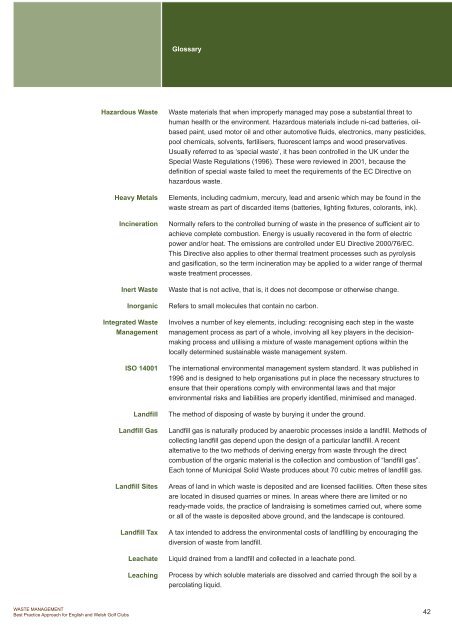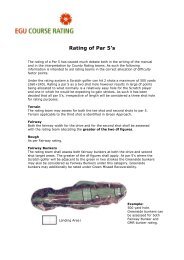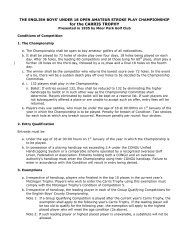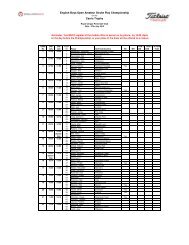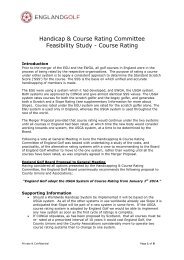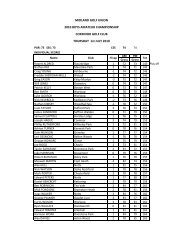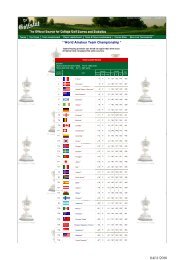Waste management - England Golf
Waste management - England Golf
Waste management - England Golf
Create successful ePaper yourself
Turn your PDF publications into a flip-book with our unique Google optimized e-Paper software.
Glossary<br />
Hazardous <strong>Waste</strong><br />
Heavy Metals<br />
Incineration<br />
Inert <strong>Waste</strong><br />
Inorganic<br />
Integrated <strong>Waste</strong><br />
Management<br />
ISO 14001<br />
Landfill<br />
Landfill Gas<br />
Landfill Sites<br />
Landfill Tax<br />
Leachate<br />
Leaching<br />
<strong>Waste</strong> materials that when improperly managed may pose a substantial threat to<br />
human health or the environment. Hazardous materials include ni-cad batteries, oilbased<br />
paint, used motor oil and other automotive fluids, electronics, many pesticides,<br />
pool chemicals, solvents, fertilisers, fluorescent lamps and wood preservatives.<br />
Usually referred to as ‘special waste’, it has been controlled in the UK under the<br />
Special <strong>Waste</strong> Regulations (1996). These were reviewed in 2001, because the<br />
definition of special waste failed to meet the requirements of the EC Directive on<br />
hazardous waste.<br />
Elements, including cadmium, mercury, lead and arsenic which may be found in the<br />
waste stream as part of discarded items (batteries, lighting fixtures, colorants, ink).<br />
Normally refers to the controlled burning of waste in the presence of sufficient air to<br />
achieve complete combustion. Energy is usually recovered in the form of electric<br />
power and/or heat. The emissions are controlled under EU Directive 2000/76/EC.<br />
This Directive also applies to other thermal treatment processes such as pyrolysis<br />
and gasification, so the term incineration may be applied to a wider range of thermal<br />
waste treatment processes.<br />
<strong>Waste</strong> that is not active, that is, it does not decompose or otherwise change.<br />
Refers to small molecules that contain no carbon.<br />
Involves a number of key elements, including: recognising each step in the waste<br />
<strong>management</strong> process as part of a whole, involving all key players in the decisionmaking<br />
process and utilising a mixture of waste <strong>management</strong> options within the<br />
locally determined sustainable waste <strong>management</strong> system.<br />
The international environmental <strong>management</strong> system standard. It was published in<br />
1996 and is designed to help organisations put in place the necessary structures to<br />
ensure that their operations comply with environmental laws and that major<br />
environmental risks and liabilities are properly identified, minimised and managed.<br />
The method of disposing of waste by burying it under the ground.<br />
Landfill gas is naturally produced by anaerobic processes inside a landfill. Methods of<br />
collecting landfill gas depend upon the design of a particular landfill. A recent<br />
alternative to the two methods of deriving energy from waste through the direct<br />
combustion of the organic material is the collection and combustion of “landfill gas”.<br />
Each tonne of Municipal Solid <strong>Waste</strong> produces about 70 cubic metres of landfill gas.<br />
Areas of land in which waste is deposited and are licensed facilities. Often these sites<br />
are located in disused quarries or mines. In areas where there are limited or no<br />
ready-made voids, the practice of landraising is sometimes carried out, where some<br />
or all of the waste is deposited above ground, and the landscape is contoured.<br />
A tax intended to address the environmental costs of landfilling by encouraging the<br />
diversion of waste from landfill.<br />
Liquid drained from a landfill and collected in a leachate pond.<br />
Process by which soluble materials are dissolved and carried through the soil by a<br />
percolating liquid.<br />
WASTE MANAGEMENT<br />
Best Practice Approach for English and Welsh <strong>Golf</strong> Clubs<br />
42


